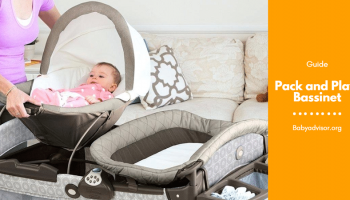
Tired parents, we know how you feel. Newborn babies sleep a lot, but parents feel as if they never get to sleep. That’s because a newborn baby sleeps in small chunks instead of the single, large amount like adults! So, that means you need to find ways to get more sleep with a newborn baby, which is a quest for all new parents.
Sleep deprivation is part of parenting, even if it’s hard. It can make daily life tricky when you want to fall asleep every time you sit down.
All new parents have to understand newborn sleep schedule. How a newborn baby sleeps and how to maximize that time. Every minute and hour counts when you’re running on fumes. It can be the difference between feeling exhausted and feeling rested!
Understanding Baby Sleep Cycles
Adults have four sleep stages that they cycle through during the night. Newborn babies, between the ages of 0 to 3 months, only experience two of the four stages of sleep: stage 3 and stage 4.
- Stage 3: This stage is deep, regenerative sleep. Your body repairs and rejuvenates the immune system, muscle tissue, and sparks growth.
- Stage 4: Stage four is REM – rapid eye movement – sleep. Your brain kicks in to consolidate information and memories throughout the day. REM is when you dream.
Once asleep, your newborn can be put down without waking – most of the time – after you rock him because he jumps right into a deep sleep stage. Around four months old, babies transition through all four stages rather than just two sleep stages.
These cycles last 30 to 45 minutes each, on average, for your baby. So, naps can last for an hour to two hours as he cycles through the two stages.

How Much Does a Newborn Baby Sleep?
Babies and infants require a lot of sleep. A healthy newborn baby will spend a majority of their 24-hour day sleeping.
To be exact, a newborn should sleep 17 to 20 hours per day, on average. These hours aren’t consecutive. If they were, parents would never have problems with sleep deprivation! A newborn will sleep one to four hours at a time. Most often, your baby will sleep two to three hours chunks.
Nighttime sleep should be eight to 12 hours, waking every two to four hours to eat. Breastfed babies do tend to wake up every two to three hours because breast milk digests faster.
Most newborns can only stay awake for 45 minutes to an hour at a time. You have to be cautious not to keep your baby awake for too long! An overtired baby is harder to get to sleep and fussy.
Throughout the first 12 weeks of life, your baby will start to develop day and night sleep patterns. By the time your baby is three months old, he will sleep 14 to 15 hours per day. Babies are always changing!
Ways to Get More Sleep with a Newborn Baby
So, now that you have a better understanding of your baby’s sleep cycles and sleep needs, it’s time to look at ways to get more sleep for YOU! Here are proven tips that DO work.
Create a Routine

Your newborn baby won’t sleep on a schedule for quite a long time, but creating a routine after birth is a great idea. Babies love predictability, and creating a routine helps signal to your baby that it’s time to go to sleep.
You may not realize it, but you probably have a routine that you stick to before going to sleep. Perhaps you drink a cup of hot tea as you watch the evening news. Then, you snuggle down in bed and read a chapter of a book before going to sleep. Chances are you use the bathroom, brush your teeth, and wash your face.
All of those actions help signal to your brain that sleep time is approaching. So, creating a routine for your baby from birth is recommended to help your child transition into sleep mode.
Don’t make your routine complicated! A few suggestions include:
- Read a short story to your baby – it’s NEVER too early to read to your baby!
- Bath
- Give baby a massage
- Lotion time
- Put on pajamas
- Nurse and rock
- Take Naps if Possible
Sometimes, it might be possible for you to take a nap. If you find those times, TAKE THEM! Don’t hesitate or think about some other way that you can use that time. Just take the nap. An hour or two can make the difference for your nighttime sleep. A few naps per week will make a huge difference for you!
Your partner should be able to help ensure you get naps. Remember, sleep is a NEED. Everyone physically needs sleep to survive, and lack of sleep can be dangerous. If your partner hesitates to help, calmly remind him that sleeping is a biological need, not a want, and you need proper rest to take care of yourself and the baby!
back to menu ↑Dream Feed
Never heard of dream feeding? You’re missing out! It’s an easy, yet useful, trick that WILL get you more sleep. Here’s how it works.
Nurse your baby and put him down for bedtime, just like you normally would. If he hasn’t woken up by the time you head to sleep, grab your baby out of bed and nurse him. Babies can drink milk while still being almost fully asleep.
Then, lay your baby back down to sleep after feeding. Now, it’s time for you to go to sleep.
Dream feeds get you an extra bit of time between the time you go to sleep for the first time and when your baby wakes up. It seems as if every time you finally lay down to go to sleep your baby wakes up within a few moments. Babies can sense when you close your eyes and get cozy.
Use dreamfeeds to get a longer, first stretch of sleep time!
back to menu ↑You may want to know more about Where Should a Newborn Baby Sleep.
Try Sleep Aids
Newborn babies love to feel snug and cozy. The womb is a loud, warm, snuggly place to live, and his new world needs to replicate that cozy feeling. There are several sleep aids that you can try!
Swaddling
Definitely try swaddling your baby! Swaddling works because it helps to recreate the cozy feeling of the womb. It reduces their startle reflex and helps your baby stay asleep for longer.
Sound Machines
The womb isn’t a quiet place. Avoid creating a super quiet environment for your baby to sleep. That means if a dog barks or friends want to visit, your baby will probably wake up. Instead, invest in a sound machine and use it from day one. Babies love the sound, and the gentle sounds help lull a baby to sleep and keep him asleep!
Dark Environment
During naps, keep the nursery light. During nighttime, you want to make sure you have a dark environment. The darkness signals that it’s night and long sleeping is taking place. Blackout curtains are the best investment when it comes to creating a dark environment.
Wearable Blankets
Some babies don’t like to be swaddled, so a wearable blanket is a good alternative choice. Blankets aren’t safe to put in your child’s crib because they’re a suffocation risk. Instead, a wearable blanket goes over your child’s pajamas, covering most of their body. It keeps your baby feel warm and cozy without posing any type of danger.
Pacifier
Once you feel as if breastfeeding is well-established, consider introducing a pacifier. Breastfeeding mothers have to be sure that they don’t use a pacifier to extend the times between feedings. However, a pacifier does reduce the risk of SIDS, and it can help lull your baby to sleep.
Enlist Help From Partner
Your partner should be ready and willing to help ensure you get to sleep. Sleep is a biological need for all humans, and sleep deprivation can lead to health problems. Plus, it can be dangerous! People fall asleep driving all the time. Don’t let that be you.
Talk to your spouse about your sleep needs, and arrange times when he gets up in the middle of the night with the baby. If you’re breastfeeding, you can have him take the baby after you nurse and head right back to sleep. Those extra times are gold! Sometimes, if you’re exceptionally tired, ask your partner to give the baby a bottle, but make sure you don’t do it often to avoid supply issues.
Take naps throughout the day. Your partner can keep the baby while you lay down to sleep for a bit.
If you don’t have a partner, talk to your friends and family. So many people are willing to come over and sit with a sweet new baby while mom takes a nap. Everyone loves snuggling a newborn baby, so it’s a win-win!
back to menu ↑Put Off Extra Responsibilities

You want to get back to feeling like your normal self soon after giving birth, but don’t push yourself. Put off any extra responsibilities that you may feel inclined to take. You don’t NEED to bring a dish to that work potluck. Everyone will understand that you’re tired!
Don’t volunteer with your child’s classroom. Skip some playdates and don’t feel obligated to head to a family party if you’re really tired.
All of these things are great, but if you’re exhausted, they’re only going to make matters worse. Right now, you need to preserve all of your energy and not waste it on activities that aren’t necessary.
Let’s be honest; you’re in a survival mode right now with a newborn baby! Your single goal is to survive until your baby sleeps longer stretches, and you CAN do it! This hard stage only lasts so long, and it’ll just be a painful memory before long.
back to menu ↑Rest Often
The old saying is to “sleep when the baby sleeps.” In theory, that sounds great, but it’s not always practical. You may have to go back to work, or you might have a child who needs to be monitored often. Napping when your toddler is still awake is never a good idea.
Instead, make sure you rest often. Put your feet up and relax. Don’t feel pressured to fold all of the clothes or wash the dishes. You need to relax and heal, and your baby needs to sleep. Dishes, laundry, and cleaning can wait until later.
Simply relaxing can be beneficial for you. Don’t feel guilty about it either. Moms tend to feel guilty when we aren’t doing something, but you ARE doing something important. You’re taking care of yourself.
back to menu ↑Say No to Visitors
New babies bring visitors, a lot of them. It can be daunting because you feel as if you need to be a good hostess. You DON’T! There is no reason to leave your pajamas, and you definitely don’t need to hide in a room to breastfeed your baby.
Visitors mean well! They’re excited to welcome and see your new baby, but don’t feel guilty if you’re just too tired. If the baby has a rough night and you’re tired, tell your friends and family that you greatly appreciate that they want to meet your new baby, but you’re just too tired that day. People understand, and you can reschedule for another time!
Also, You can read more about Pack and Play for Newborn Baby in our full review.
Putting It All Together
Your newborn baby cycles through his two sleep stages for 16 to 20 hours per day in small chunks. Those chunks aren’t consecutive or nearly as long as adults need to feel rejuvenated and rested. So, parents need to find ways to get more sleep to avoid sleep deprivation.
Using sleep aids, like swaddling and white noise, can help to lengthen the time between wake ups. Every minute counts! Start creating a sleeping routine to help your baby’s brain learn to signal it’s bedtime and start winding down.
In the weeks following your baby’s birth, make sure you take it easy and avoid too many visitors. Spend as much time as possible resting and napping, when possible. Head to bed earlier and take advantage of every second possible to maximize your sleeping time.






